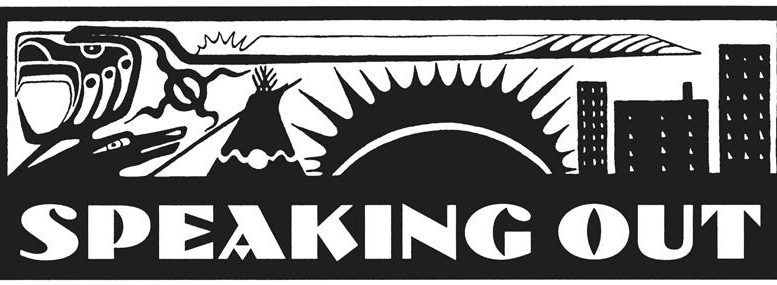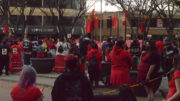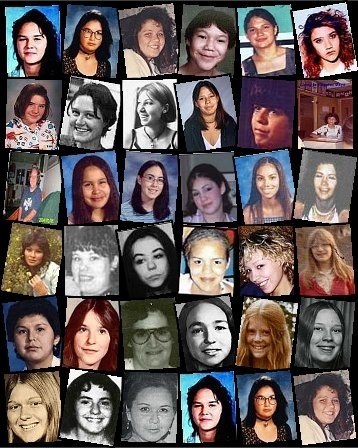by the National MMIW Inquiry Commissioners
(June 3, 2020) – One year ago, the National Inquiry into Missing and Murdered Indigenous Women and Girls presented its Final Report, Reclaiming Power and Place, through ceremony to Prime Minister Justin Trudeau and to each province and territory. After almost three years of heartbreaking testimony, families and survivors gathered in Gatineau, Quebec, to see the culmination of one phase of the journey, and the beginning of another. Families gathered expressed hope for a new future – one that would see the safety and security of sisters, mothers, aunties, daughters, granddaughters, partners and friends.
Sharing deeply personal stories and articulating best practices as encapsulated within the Final Report within the constraints of the mandate was not easy. Therefore, we first acknowledge the thousands of First Nations, Inuit and Metis families, survivors, Elders, community members, grass roots and front-line leaders, experts and knowledge keepers and other witnesses who shared their truths and their strength. To these families and individuals, we say “thank you”, for re-writing Canadian history by courageously telling your truths. We also acknowledge all the work of the families, survivors, grassroots organizations and frontline workers who have taken these truths to heart, and who continue the hard work of seeking justice and fight daily to keep our Indigenous women, girls and 2S people safe. Finally, we acknowledge the individuals and organizations that have taken to heart the need for all Canadians to read the Final Report, to learn the true history of Canada.
Despite these successes and a growing awareness of the issues, we deplore inaction on the part of some governments. As the Final Report asserts, the Calls for Justice are not mere recommendations or a quaint list of best practices – they are legal imperatives rooted in Canada’s obligations under international and domestic human rights norms and laws. As the ongoing levels of violence attest, the fundamental human rights and Indigenous rights of Indigenous women, girls and 2S people continue to be violated daily in Canada, and Indigenous women, girls and 2S people continue to be subjected to colonial violence, physical violence, disappearances and murder.
In addition, as the Principles of Change and Call for Justice 1.1 of the Final Report demonstrate, how the Calls for Justice are implemented is as imperative as the Calls for Justice themselves. To start, implementation must be done in a manner that restores Indigenous women, girls and 2SLGBTQQIA people to their leadership roles. It is central to the process. In addition, the work must be trauma-informed: that means being transparent and accountable.
To date, families, survivors and Canadians have yet to be presented with the federal government’s workplan for implementation or any progress on the National Action Plan. There has been little, if any, commitment demonstrated to ensure the work is led by Indigenous Peoples, with Indigenous women, girls and 2SLGBTQQIA peoples central in that process. With the exception of Yukon, which has developed comprehensive plans and commenced implementation, there has been deafening silence and unacceptable inaction from most governments.
The path towards a decolonized Canada requires a profound change in thinking. Addressing genocide requires an honest and active process of decolonization of structures, institutions, legislation and policies. The swift implementation of the National Inquiry’s Calls for Justice is essential to address Canada’s responsibility for the commission of genocide and for violations of fundamental human rights.
Due to the one year of inaction, the lack of transparency, the growing race and gender-based tensions, Indigenous people’s distrust of governments, and the failure to heed the principles for change in the Final Report, we assert the need for international attention to implementation. Without the establishment of the Ombudsperson and Tribunal as per Call for Justice 1.7, there is no fair and just forum in Canada where Indigenous women, girls and 2S people can turn to ensure full participation in the implementation process for the Calls for Justice. We call on Canada to move past fear and in partnership with Indigenous women, girls and 2S people, engage an international and impartial organization to mediate and oversee the implementation of the Calls for Justice. Should Canada fail to do so in a timely manner, we strongly encourage Indigenous women, girls and 2S people to invite international and impartial oversight of the implementation of the Calls for Justice.
After all, lives depend on it.
Marion Buller, Michèle Audette, Brian Eyolfson and Qajaq Robinson are the commissioners from the National Commission on Missing and Murdered Indigenous Women and Girls.





Be the first to comment on "Missing and Murdered Indigenous Women’s Report deserves action – It’s been a year of inaction"